

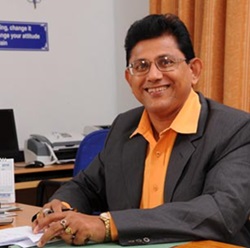
Dr. K. L. Narayana, Director, IcfaiTech
IcfaiTech, one of the constituent schools of the ICFAI Foundation for Higher Education (IFHE), recently hosted IOT Genesis 2024, focusing on fostering critical thinking and innovation in the Internet of Things (IoT). The event showcased practical applications of advanced communication technology in our daily lives, offering valuable experience to undergraduates and faculty. It marks a promising start toward addressing real-world challenges through scientific endeavors.
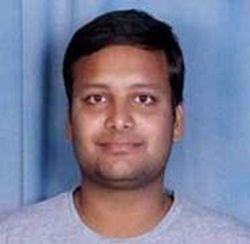
Dr. Asisa Kumar Panigrahy, Associate Professor and Head of the Dept. of ECE
The department's core objective is to prepare students to apply engineering principles effectively in real-world contexts. To achieve this, it has invested significantly in state-of-the-art laboratories spanning electronics, communication, digital signal processing, RF and microwave engineering, embedded systems, microcomputers, and VLSI design. Additionally, a dedicated research laboratory focuses on VLSI and related areas.
The department fosters interdisciplinary learning through cross-cutting knowledge systems and encourages students to pursue their interests through projects and courses that span multiple disciplines. The curriculum is regularly updated to incorporate the latest scientific and technological advancements, with input from industry, alumni, and academic stakeholders. Students are encouraged to engage in a variety of research projects and gain industry experience to enhance their skill set.
Our department consists of a team of 13 dedicated faculty members with exceptional academic backgrounds, supported by 2 technical staff, numerous research scholars, and industry professors. Many faculty members actively contribute to the academic community by reviewing technical articles for journals and serving on editorial boards.
We prioritize preparing students for real-world challenges by staying up-to-date of market trends and offering a diverse range of elective courses. Our department emphasizes hands-on learning and research, facilitated by four main research groups: RF and Microwave Communication, Antenna Design, IoT, and VLSI Design. Through innovative technologies and collaborative efforts, we aspire to address critical societal issues and contribute to societal advancement.
The Department of Electronics and Communication Engineering (ECE) at IFHE Hyderabad has been designated as a Nodal Center by the Indian Institute of Remote Sensing (IIRS) Dehradun in collaboration with the Indian Space Research Organization (ISRO). This accreditation allows faculty and students to access online courses offered by IIRS, ISRO, and Dehradun, enhancing their knowledge and skills in remote sensing.
The department's progress in electronics, wireless and mobile communications, and VLSI system design is impressive. There is a tangible excitement surrounding the department, with labs and classrooms bustling with energy that fuels both teachers' creativity and students' enthusiasm. Being part of the Electronics and Communication Engineering Department at ICFAI University Hyderabad offers an enriching experience in an era where electronics profoundly influence daily life and promise groundbreaking innovations.
Dr. U Anil Kumar, Dr. Asisa Kumar Panigrahy, and Dr. P Akhendra Kumar, faculty members of the ECE Department at FST, IFHE Hyderabad, organized the IoT Hackathon called 'IOT Genesis-2024'. It was held on April 18th, 2024, at IcfaiTech, IFHE Hyderabad's campus, the event aimed to foster innovation and collaboration among participants in the Internet of Things (IoT) domain. This dynamic event brought together individuals from across India who share a passion for IoT, providing them with a platform to showcase their skills and ideas while fostering a culture of teamwork and creativity. The IOT Genesis-2024 event, spanning a single day, complemented the Hackathon, offering an enriching experience for all involved.
The prime focus of the hackathon was solving the current societal needs, which follows:
1. Agriculture and Rural Development:
2. Health care and Biomedical devices:
3. Smart Systems:
4. Renewable Energy sources for Rural Development:
5. Waste Management:
Registration Process: for the students
Link for Registration: https://tinyurl.com/3rk23yzd
Registration fees: NIL
The IoT GENESIS Hackathon offers a unique opportunity to revolutionize the realm of connected devices. In a landscape where IoT reshapes industries and everyday routines, your innovative ideas could pave the way for the next breakthrough. Join us to:
- Solve real-world IoT challenges and make a positive impact.
- Gain hands-on experience working with cutting-edge IoT hardware and software.
- Collaborate with like-minded individuals and expand your network.
- Showcase your skills to leading experts and industry professionals.
- Win an exciting prize pool of 50K.
First Prize:25,000/-
Second Prize: 15,000/-
Third Prize: 10,000/-
--IMPORTANT DATES:--
- REGISTRATION ENDS ON: 22/03/2024
- SHORTLISTED IDEAS ANNOUNCEMENT: 25/03/2024
- IDEA PRESENTATION (ONLINE): 28/03/2024
- HACKATHON DAY: 18/04/2024
Selection Process:
Students were asked to submit an initial document including:
1. Description and block diagram of their idea.
2. Use-case for the application.
3. Team description, contact details, and mailing address.
• Following this, coordinators evaluated the ideas and moved to the next stage: Online idea presentation.
• The online presentation occurred on 01/04/2024 (Monday) via Google Meet.
Presentation Format:
Duration: Each presentation will be 7 minutes long, followed by a 3-minute Q&A session.
Platform: We will be using Google Meet for the presentations. Presenters should ensure they're familiar with the platform and test their audio/video settings beforehand.
Content Guidelines:
Introduction:
Briefly introduce yourself and your team members (if applicable).
Provide an overview of your project and its objectives.
Problem Statement:
Clearly articulate the problem your project aims to solve.
Highlight the significance and impact of addressing this problem.
Solution Overview:
Describe your proposed solution in detail, including its key features and functionalities.
Explain how your solution effectively addresses the identified problem.
Technical Details:
Describe your proposed solution in detail, highlighting its key features and functionalities.
Discuss any challenges encountered during the development process and how they were overcome.
Implementation Demo (optional):
For live demos, ensure thorough preparation to showcase the functionality of your solution effectively.
Demonstrate key features and interactions to give judges a clear understanding of your project's capabilities.
Results and Impact:
Share any preliminary results, prototypes, or user feedback acquired during the development phase.
Discuss the potential impact of your project and how it addresses user needs or market demands.
Q&A Session:
Be prepared to answer questions from the judging panel and other participants.
Anticipate inquiries related to your project's feasibility, scalability, and potential challenges.
Time Management:
Adhere to the allotted presentation time to ensure fairness to all participants.
Practice your presentation to ensure it fits within the designated timeframe.
Feedback and Evaluation:
Presentations will be evaluated based on innovation, feasibility, presentation skills, and impact criteria.
Embrace constructive feedback to facilitate learning and improvement.
Final Reminders:
Presenters should ensure a stable internet connection and a conducive presentation environment.
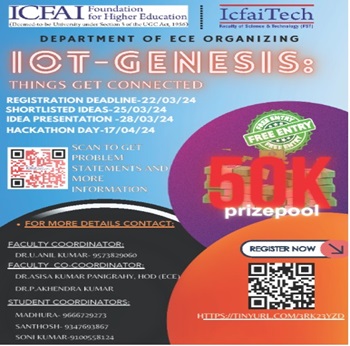
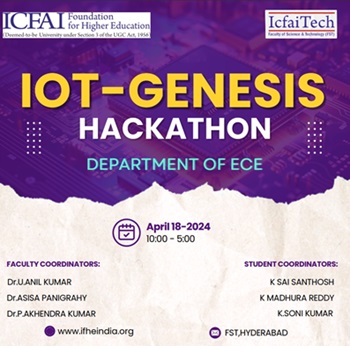
The IoT Hackathon Competition proved to be a catalyst for creativity and problem-solving within the field. Drawing participants from across India, the event was a resounding success, showcasing a diverse range of original ideas and generating excitement among attendees. The competition sparked new technological developments and underscored the importance of teamwork in achieving success. It highlighted the limitless potential of the Internet of Things and motivated participants to continue exploring novel approaches to challenging problems. IOT Genesis-2024 was an extraordinary success, leaving a lasting impact on all who participated.
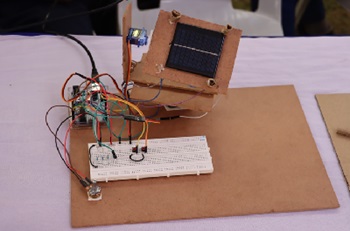
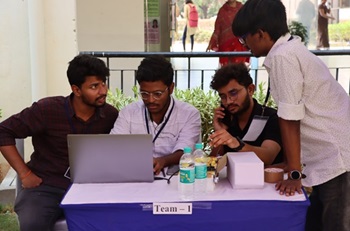
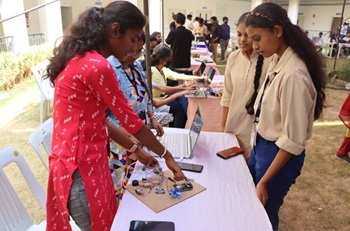
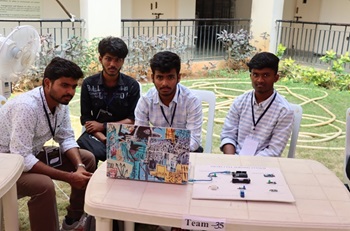
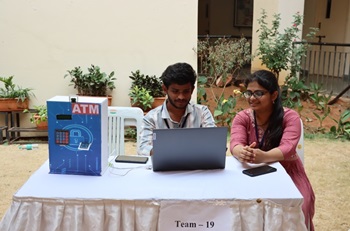
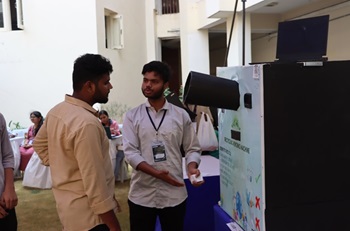
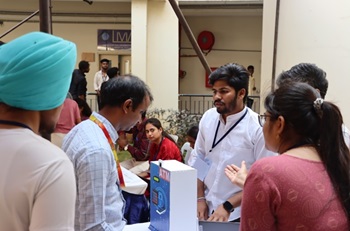
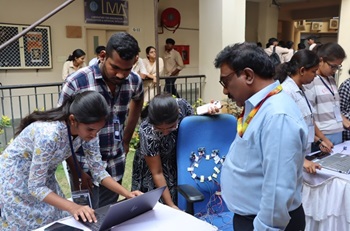
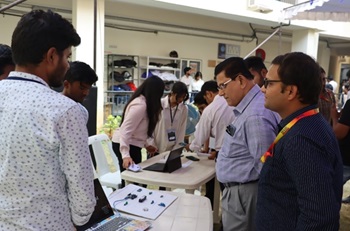
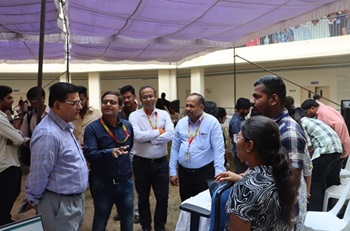
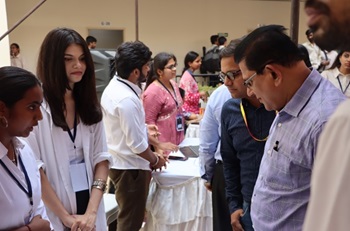
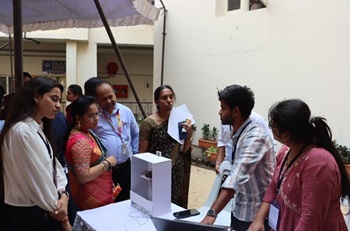
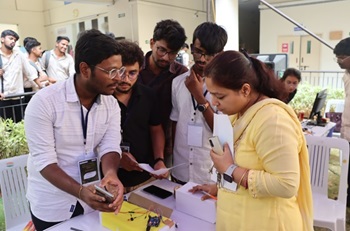
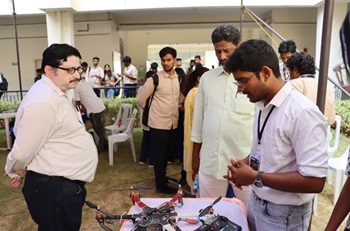
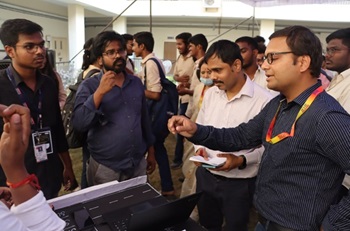
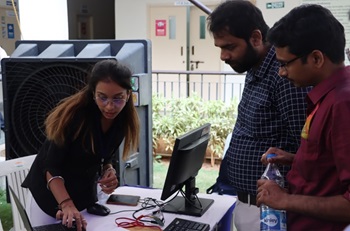
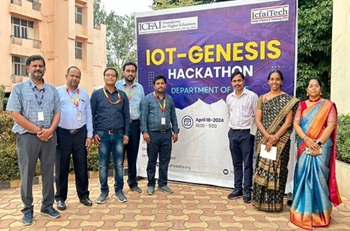
| Sl.No | Team number and Team leader name | Project Title | Amount | Position |
|---|---|---|---|---|
| 1 | TEAM 19-KATIKE MADHUKAR | RF Based ATM security system with image verification | 25,000/- | 1st |
| 2 | TEAM 36-ARUSHI PURI | AgroscanAI | 15,000/- | 2nd |
| 3 | TEAM 30-K.SHUSHANTH GOUD | AI Human Activity Recognition | 5000/- | 3rd |
| 4 | TEAM 38- P VAMSHI KRISHNA | Voice Controlled Car/Robot | 5000/- | 3rd |
First Prize: RF Based ATM security system with image verification:
Abstract: The ATM Security System combines RF technology and facial recognition to enhance transaction security. Users authenticate themselves by presenting an RF tag, triggering image capture for database comparison. Successful matches facilitate transactions, while mismatches prompt an OTP to the registered number and an email with the captured image for user confirmation. This multi-layered approach strengthens security, making unauthorized access difficult, even with compromised PINs. Prioritizing user security ensures that funds are only accessible to rightful account holders, enhancing safety and confidence in financial transactions.
Second Prize : AgroscanAI
Abstract: AgroScanAi is a revolutionary web app transforming agriculture through AI-driven crop management. Farmers can upload field videos for analysis, utilizing AI models like the grounding dino and segment anything for precise crop assessments. The app offers multilingual support in English and Hindi, ensuring accessibility for Indian farmers. It integrates with APIs for advanced analytics and includes a feature for inputting watering schedules, optimizing irrigation management and water usage. By providing actionable insights, AgroScanAi aims to increase yields and promote sustainable farming practices. Tailored for Indian agriculture, it addresses diverse challenges and facilitates a transition to precision farming. As technology reshapes farming, AgroScanAi bridges tradition and innovation, positioning itself as a crucial tool in modernizing Indian agriculture.
Third Prize: AI Human Activity Recognition
Abstract: Due to its widespread use with acquisition devices like smartphones and video cameras, as well as its capacity to record human activity data, human activity recognition (HAR) has several uses. Artificial intelligence (AI) has revolutionized the ability to extract deep-buried information for precise detection and interpretation, even as electronic gadgets and their applications continue to proliferate. This results in a deeper comprehension of the three HAR pillars—applications, AI, and increasingly expanding acquisition devices—all under one roof. Numerous reviews of HAR's broad features have been published; however, only a small number of them have analyzed every HAR device simultaneously, and even fewer have examined the effects of changing AI architecture.
The program served as a platform for knowledge exchange and skill development, empowering participants to contribute to IoT advancements. The event's success was attributed to the dedication of coordinators Dr. U. Anil Kumar, Dr. Asisa Kumar Panigrahy, and Dr. P Akhendra Kumar, and the active participation of attendees. Such initiatives are vital for fostering innovation and progress in the IoT field. The event concluded with valedictory speeches and prize distribution by Mr. Anirudha Kulkarni, Resource Person, Dr. K.L. Narayana, Director-FST, and Dr. Asisa Kumar Panigrahy, HOD ECE, in the presence of jury members.
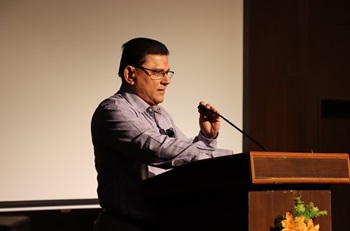
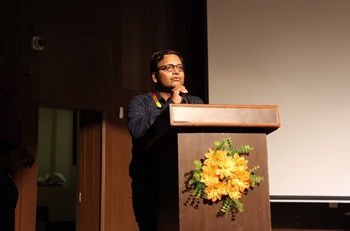
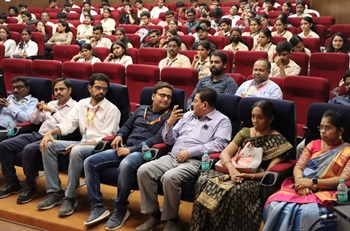
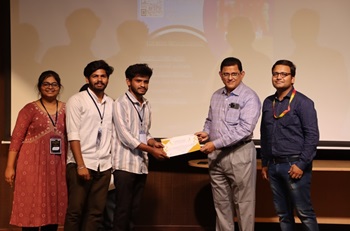
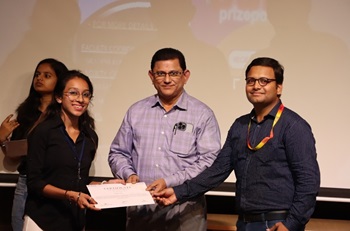
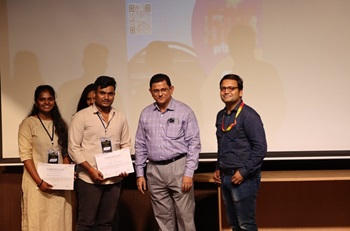
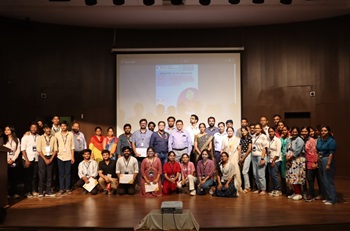
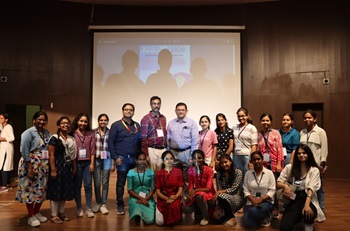
Special Thanks to the student coordinators: Madhura, Santosh, Soni Kumar